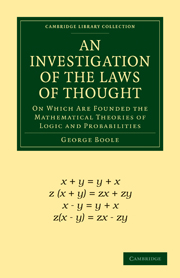 An Investigation of the Laws of Thought
An Investigation of the Laws of Thought Book contents
- Frontmatter
- PREFACE
- Contents
- CHAPTER I NATURE AND DESIGN OF THIS WORK
- CHAPTER II SIGNS AND THEIR LAWS
- CHAPTER III DERIVATION OF THE LAWS
- CHAPTER IV DIVISION OF PROPOSITIONS
- CHAPTER V PRINCIPLES OF SYMBOLICAL REASONING
- CHAPTER VI OF INTERPRETATION
- CHAPTER VII OF ELIMINATION
- CHAPTER VIII OF REDUCTION
- CHAPTER IX METHODS OF ABBREVIATION
- CHAPTER X CONDITIONS OF A PERFECT METHOD
- CHAPTER XI OF SECONDARY PROPOSITIONS
- CHAPTER XII METHODS IN SECONDARY PROPOSITIONS
- CHAPTER XIII CLARKE AND SPINOZA
- CHAPTER XIV EXAMPLE OF ANALYSIS
- CHAPTER XV OF THE ARISTOTELIAN LOGIC
- CHAPTER XVI OF THE THEORY OF PROBABILITIES
- CHAPTER XVII GENERAL METHOD IN PROBABILITIES
- CHAPTER XVIII ELEMENTARY ILLUSTRATIONS
- CHAPTER XIX OF STATISTICAL CONDITIONS
- CHAPTER XX PROBLEMS ON CAUSES
- CHAPTER XXI PROBABILITY OF JUDGMENTS
- CHAPTER XXII CONSTITUTION OF THE INTELLECT
- ERRATA
CHAPTER IV - DIVISION OF PROPOSITIONS
Published online by Cambridge University Press: 05 November 2011
- Frontmatter
- PREFACE
- Contents
- CHAPTER I NATURE AND DESIGN OF THIS WORK
- CHAPTER II SIGNS AND THEIR LAWS
- CHAPTER III DERIVATION OF THE LAWS
- CHAPTER IV DIVISION OF PROPOSITIONS
- CHAPTER V PRINCIPLES OF SYMBOLICAL REASONING
- CHAPTER VI OF INTERPRETATION
- CHAPTER VII OF ELIMINATION
- CHAPTER VIII OF REDUCTION
- CHAPTER IX METHODS OF ABBREVIATION
- CHAPTER X CONDITIONS OF A PERFECT METHOD
- CHAPTER XI OF SECONDARY PROPOSITIONS
- CHAPTER XII METHODS IN SECONDARY PROPOSITIONS
- CHAPTER XIII CLARKE AND SPINOZA
- CHAPTER XIV EXAMPLE OF ANALYSIS
- CHAPTER XV OF THE ARISTOTELIAN LOGIC
- CHAPTER XVI OF THE THEORY OF PROBABILITIES
- CHAPTER XVII GENERAL METHOD IN PROBABILITIES
- CHAPTER XVIII ELEMENTARY ILLUSTRATIONS
- CHAPTER XIX OF STATISTICAL CONDITIONS
- CHAPTER XX PROBLEMS ON CAUSES
- CHAPTER XXI PROBABILITY OF JUDGMENTS
- CHAPTER XXII CONSTITUTION OF THE INTELLECT
- ERRATA
Summary
OF THE DIVISION OF PROPOSITIONS INTO THE TWO CLASSES OF “ PRIMARY” AND “ SECONDARY;” OF THE CHARACTERISTIC PROPERTIES OF THOSE CLASSES, AND OF THE LAWS OF THE EXPRESSION OF PRIMARY PROPOSITIONS.
1. The laws of those mental operations which are concerned in the processes of Conception or Imagination having been investigated, and the corresponding laws of the symbols by which they are represented explained, we are led to consider the practical application of the results obtained: first, in the expression of the complex terms of propositions; secondly, in the expression of propositions; and lastly, in the construction of a general method of deductive analysis. In the present chapter we shall be chiefly concerned with the first of these objects, as an introduction to which it is necessary to establish the following Proposition:
PROPOSITION I.
All logical propositions may be considered as belonging to one or the other of two great classes, to which the respective names of “Primary” or “Concrete Propositions, ” and “Secondary” or “Abstract Propositions” may be given.
Every assertion that we make may be referred to one or the other of the two following kinds. Either it expresses a relation among things, or it expresses, or is equivalent to the expression of, a relation among propositions. An assertion respecting the properties of things, or the phænomena which they manifest, or the circumstances in which they are placed, is, properly speaking, the assertion of a relation among things.
- Type
- Chapter
- Information
- An Investigation of the Laws of ThoughtOn Which Are Founded the Mathematical Theories of Logic and Probabilities, pp. 52 - 65Publisher: Cambridge University PressPrint publication year: 2009First published in: 1854
